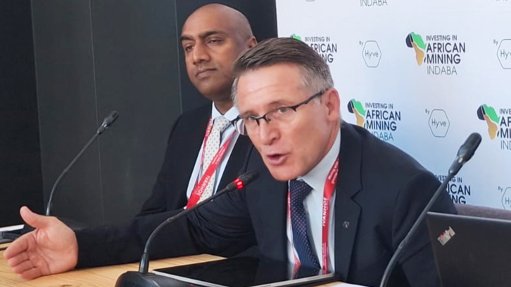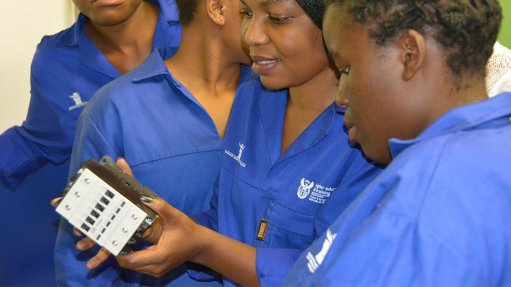Africa uniquely positioned to be a major player in climate actions
Africa is uniquely positioned to become a major player in global climate actions because it contains 60% of the globe’s arable land, has highly diverse and unique ecosystems and has significant potential to generate renewable energy that arises from the abundance of wind and sunlight across the continent, as well as the space to house wind and solar farms.
These factors were noted by Ghana’s Kwame Nkrumah University of Science and Technology plant ecologist Dr Mohammed Armani during a webinar that forms part of the Tipping Points series, which focuses on topical discussions on issues affecting development and the environment in Africa. The webinar was hosted by Oppenheimer Generations Research and Conservation (OGRC).
The sixth episode of the series, held on July 29, explored how OGRC and partner Future Ecosystems for Africa were working with not-for-profit think tank African Group of Negotiators Experts Support (AGNES) to lend scientific backing to Africa's position at COP27.
In February, AGNES, in partnership with OGRC, the University of the Witwatersrand and the African Union Development Agency New Partnership for Africa’s Development (AUDA-NEPAD), commissioned a working paper report on land-based climate change actions in Africa, with the aim of deepening the understanding of the relationship between land and climate change mitigation and adaption in Africa.
Climate actions constitute any policy, measure or method that reduces greenhouse-gas (GHG) emissions, builds resilience to climate change or supports and finances those goals.
Armani headed up this research, which was comprised of an extensive literature review along with consultations with various experts on climate trends in Africa, climate commitments made by African countries, and the potential synergies and trade-offs between climate actions, biodiversity conservation and rural livelihoods.
The scope of the study covered two main areas of focus – emission reduction and carbon removal.
Emission reduction climate actions involve the conservation and protection of ecosystems through the avoidance of deforestation and conversion of that land into mines, farms, infrastructure or urban development.
Emission reduction climate actions also involve the promotion of sustainable agriculture. This involves aspects such as reductions in energy consumption, better management of nutrients and manure, as well as the mitigation of enteric fermentation, which is considered one of the main sources of GHG emissions.
Carbon removal, on the other hand, involves actions such as reforestation, afforestation or grassland restoration, as well as agroforestry and the management of ecosystems.
The draft report has been finalised and is about 91 pages long, comprising the review of 430 studies. The report is undergoing expert review before it is published.
Armani said climate actions in Africa should be geared more towards adaptation than mitigation, although opportunities for mitigation should be considered, whether in terms of maintaining and promoting intact ecosystems or in terms of transformed landscapes.
He highlighted that context-specific climate actions were required to reduce trade-offs and increase synergies. To achieve this, land-based climate actions needed to achieve several minimum criteria.
These criteria included reducing climate threats and risks to socio-ecological systems, as well as addressing the United Nations' Sustainable Development Goals, particularly biodiversity conservation and livelihoods. Other criteria were the need to improve natural resource governance, reduce land inequalities and tenure constraints, and improve climate securities.
All of this needed to be based on a sound ecological understanding of the ecology, structure and functioning of the targeted ecosystem.
Article Enquiry
Email Article
Save Article
Feedback
To advertise email advertising@creamermedia.co.za or click here
Announcements
What's On
Subscribe to improve your user experience...
Option 1 (equivalent of R125 a month):
Receive a weekly copy of Creamer Media's Engineering News & Mining Weekly magazine
(print copy for those in South Africa and e-magazine for those outside of South Africa)
Receive daily email newsletters
Access to full search results
Access archive of magazine back copies
Access to Projects in Progress
Access to ONE Research Report of your choice in PDF format
Option 2 (equivalent of R375 a month):
All benefits from Option 1
PLUS
Access to Creamer Media's Research Channel Africa for ALL Research Reports, in PDF format, on various industrial and mining sectors
including Electricity; Water; Energy Transition; Hydrogen; Roads, Rail and Ports; Coal; Gold; Platinum; Battery Metals; etc.
Already a subscriber?
Forgotten your password?
Receive weekly copy of Creamer Media's Engineering News & Mining Weekly magazine (print copy for those in South Africa and e-magazine for those outside of South Africa)
➕
Recieve daily email newsletters
➕
Access to full search results
➕
Access archive of magazine back copies
➕
Access to Projects in Progress
➕
Access to ONE Research Report of your choice in PDF format
RESEARCH CHANNEL AFRICA
R4500 (equivalent of R375 a month)
SUBSCRIBEAll benefits from Option 1
➕
Access to Creamer Media's Research Channel Africa for ALL Research Reports on various industrial and mining sectors, in PDF format, including on:
Electricity
➕
Water
➕
Energy Transition
➕
Hydrogen
➕
Roads, Rail and Ports
➕
Coal
➕
Gold
➕
Platinum
➕
Battery Metals
➕
etc.
Receive all benefits from Option 1 or Option 2 delivered to numerous people at your company
➕
Multiple User names and Passwords for simultaneous log-ins
➕
Intranet integration access to all in your organisation


















